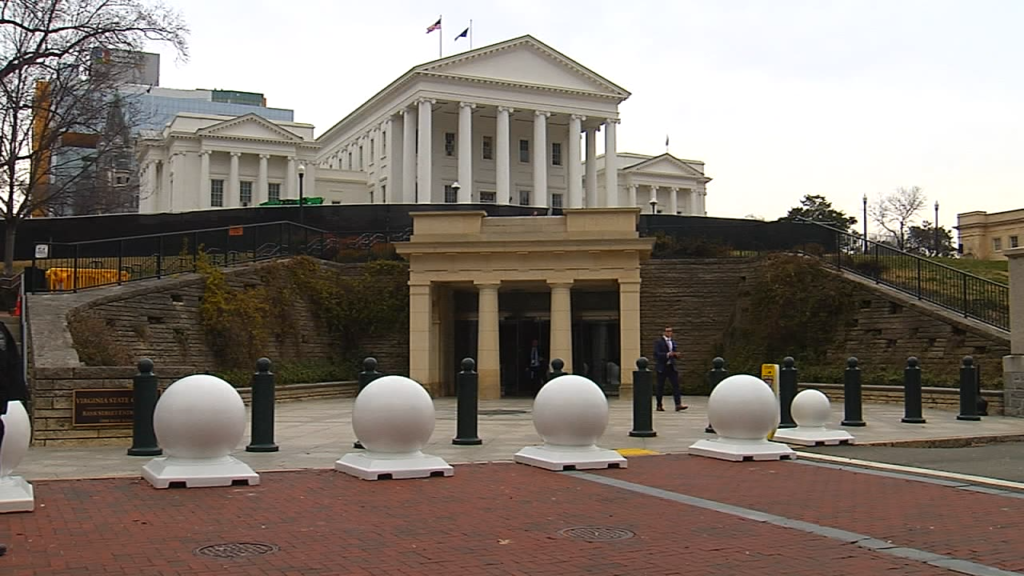RICHMOND, Va. (WRIC) — Virginia’s hemp farmers and CBD shops fear new proposed limits in the General Assembly will decimate the industry. Supporters of the bills, which have won bipartisan approval, argue cracking down on intoxicating products is necessary to protect consumers.
Negotiations will continue behind closed doors now that the House and Senate have passed different versions of the legislation. The decisions made in the coming days could impact which products stay and go, though Governor Glenn Youngkin will still have a chance to make amendments.
“This whole law isn’t just getting Delta-8 off the streets. This law has consequences, as written, that is going to wipe out a whole industry,” said Evan Somogyi, owner of Kultivate Wellness in Midlothian.
Somogyi said he stopped selling Delta-8 last year after state lawmakers approved budget language that tightened regulations around hemp-derived products.
But on Monday, he pointed to entire sections of his store, including shelves displaying edible gummies and CBD dog treats, with a sense of panic.
“If these laws pass, 99% of the products that we sell would not be available anymore,” Somogyi said.
That’s a consensus position among the hemp farmers, manufacturers, distributors and retailers represented by the Virginia Healthy Alternatives Association, according to the group’s President Yan Gleyzer.
“There is a way to separate the intoxicating products from the non-intoxicating products, but unfortunately, with this bill, there is no middle ground,” Gleyzer said. “If they want to regulate intoxicating products, we’ll support it.”
Gleyzer said they’re concerned about new proposed limits on THC, the psychoactive component in cannabis that causes a high. If passed, he said Virginia’s caps would be stricter than federal law, giving them a competitive disadvantage and forcing consumers who rely on their products to look across state lines.
“We’re following federal guidelines and Virginia is trying to overstep those guidelines,” Somogyi said. “It has been very frustrating and very disheartening.”
Bill sponsor Senator Emmett Hanger (R-Augusta) said new limits are necessary to ban intoxicating, synthetic products like Delta-8 that were never explicitly legalized but have become increasingly common under vague laws. He believes the federal government will tighten the belt soon too, following suit with other states that have already passed new restrictions on certain hemp products.
Asked about the concerns of hemp shops, Hanger said he thinks there is “quite a bit of misinformation out there” and the “CBD industry is alive and well.”
“We will define it in the way I think in the final bill that those products that are edibles, that are intoxicating in their effect, will be illegal to have on the shelves,” Hanger said. “I think we have to look at consumer safety and, in this instance, children, health and safety is more paramount to somebody making a couple of dollars off of selling a product that can be dangerous.”
The bill that passed out of the House of Delegates caps total THC concentration at 0.3%. It also contains a provision allowing no more than two milligrams of total THC per package, a limit not included in federal law.
The substitute that most recently gained Senate approval doesn’t set a specific per-package limit on THC, but instead directs the Cannabis Control Authority to write those rules, according to Hanger.
“I think everyone that’s at the table right now is committed to some cap. So we just have to figure out where that cap is going to be,” said House Republican Leader Terry Kilgore (R-Gate City), who sponsored the House version of the bill.
The final bill is also expected to address consumer safety requirements for product testing, labeling and child-proof packaging–all things the hemp industry supports and largely already does, according to Gleyzer.
Additionally, lawmakers are requesting more money for enforcement and tinkering with registration requirements.
“Absent regulatory oversight, consumers don’t know whether they’re getting a safe, tested product or one contaminated with potentially dangerous adulterants. Study after study has demonstrated that what’s on the label is rarely what’s in the product. Consumers deserve transparency and they ought to know if what they’re purchasing is intoxicating before they ingest it,” said Virginia NORML’s JM Pedini in a statement.
Some argue the refusal of House Republicans to move forward with a regulated, adult-use market for recreational marijuana has contributed to the proliferation of unsafe products.
However, Hanger doesn’t expect the Senate’s effort to keep the ball rolling on recreational marijuana sales using his bill to be successful. Hanger said the change would allow the Cannabis Control Authority to craft regulations for the legal market and bring them back for consideration in 2024, but he opposes coupling the issues and so does Governor Glenn Youngkin’s administration.
Asked if Governor Youngkin has a specific stance on proposed THC limits, spokesperson Macaulay Porter referred to a quote previously given to 8News.
“Let me be clear, the bill I am tracking and looking for is a bill that deals with hemp and delta-8 and the regulations and consumer safety around those products. Right now, we have products that are being mislabeled, mis-sold and targeted towards children,” Youngkin said at an event last month. “That is the bill that I am watching to make sure that comes out because that’s the bill I want to sign.”
H/T: www.wric.com



